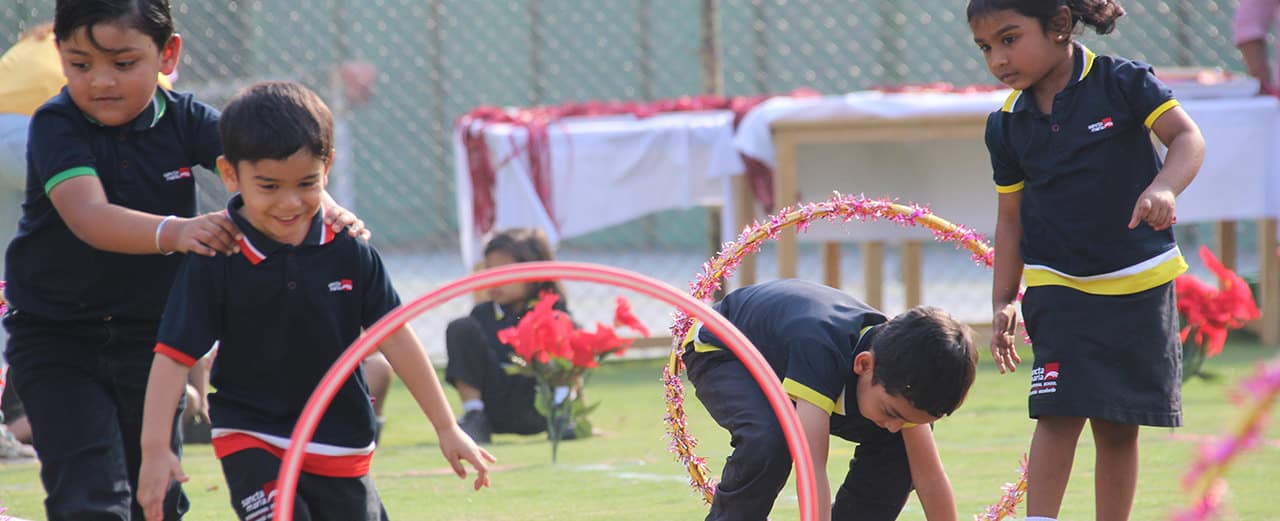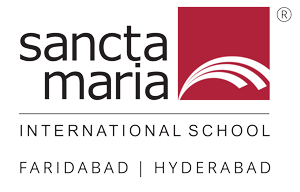
- Home
- /
- Life@Sancta Maria
- /
- IB Primary Years Programme...
IB Primary Years programme (PYP)
Sancta Maria International School, Faridabad is an IB PYP Candidate School.
IB Primary Years Programme (PYP) Early Years
The PYP Early Years (for children aged 3 – 6) offers a holistic learning experience that integrates socio-emotional, physical, and cognitive development . The program acknowledges the unique needs of early learners and recognizes that learners in this age range require approaches to learning and teaching that honor their developmental stage, and the importance of play as the vehicle for inquiry.
In the PYP Early Years, students explore their environment and learn about their world through play and relationships with peers, teachers, family, and community members. Teachers are partners, nurturers, and guides who help facilitate the exploration of children’s interests as they work on long- and short-term projects. Sancta Maria International School cultivates dynamic environments where curiosity, creativity, and confidence flourish.
The importance of play
The IB Mission Statement:
IB Primary Years Programme (Grades 1 – 5)
We offer the Primary Years Programme, an internationally recognised educational framework for students aged 3 to 12. The International Baccalaureate Primary Years Programme, fosters inquiry-based learning and encourages students to become active, compassionate, and lifelong learners.
At Sancta Maria, we believe that education should empower students to develop their full potential and positively impact the world. The International Baccalaureate Primary Years Programme provides a holistic approach to education, focusing on the whole child’s development—academically, socially, emotionally, and physically.
The PYP strongly emphasises inquiry-based learning, where students actively explore questions, investigate topics, and construct their own understanding. This approach nurtures critical thinking, curiosity, and a love for learning as students develop research skills, ask meaningful questions and engage in hands-on experiences.
Key features of the PYP include:
Transdisciplinary Curriculum:
The International Baccalaureate Primary Years Programme offers a comprehensive curriculum integrating knowledge, skills, and concepts across subject areas. Students explore six transdisciplinary themes, which are
- Who We Are
- How we Express Ourselves
- How the World Works
- Where we are in place and time
- How We Organise Ourselves and
- Sharing the Planet.
These themes promote connections between different subjects and encourage students to apply their learning to real-world situations.
ATL Skills
In the Primary Years Programme (PYP), there is a strong emphasis on the development of Approaches to Learning (ATL) skills. These skills equip students with the tools and dispositions necessary for effective learning and future success. The ATL skills in the PYP encompass five key areas:
1. Thinking Skills
These skills help students develop critical and creative thinking abilities. They include skills such as analysing, evaluating, synthesising, and applying knowledge. Students learn to think critically, make connections, and solve problems in various contexts.
2. Research Skills
Research skills empower students to inquire, gather, evaluate, and use information effectively. They learn to identify and select appropriate sources, gather data, and analyse information. Students also develop skills in referencing and ethical use of information.
3. Communication Skills
Communication skills focus on helping students express themselves confidently and effectively. Students learn to listen actively, speak clearly and coherently, and communicate their ideas and understandings through various mediums. They also develop skills in reading, writing, and presenting information.
4. Social Skills
Social skills promote effective interaction and collaboration with others. Students learn to work cooperatively in groups, resolve conflicts, and build positive relationships. They develop skills in active listening, empathy, respect, and understanding diverse perspectives.
5. Self-Management Skills
Self-management skills aim to develop students’ organisational and self-regulation abilities. Students learn to set goals, manage their time, prioritise tasks, and take responsibility for their learning. They develop skills in planning, organising, and reflecting on their progress.
These ATL skills are integrated throughout the PYP curriculum and are not taught in isolation. Teachers intentionally design learning experiences that allow students to develop and apply these skills authentically and meaningfully. Through inquiry-based learning, students actively develop these skills as they explore and make connections across different subject areas and real-life contexts.
The development of ATL skills in the PYP is essential for fostering independent and lifelong learners. These skills enable students to become critical thinkers, effective communicators, collaborative team members, and self-directed individuals prepared for future challenges and opportunities.
International Mindedness:
As an IB programme, the PYP promotes international mindedness by fostering an appreciation of different cultures, perspectives, and languages. Students are encouraged to participate actively in their local and global communities, developing a sense of responsibility and respect for diversity.
The PYP aims to develop students as internationally-minded individuals through the IB Learner Profile, an integral part of the written and taught curriculum.
The ten attributes of the IB Learner Profile are:
1. Inquirers
Students are curious, enthusiastic, and actively engaged in their learning. They develop their natural curiosity and acquire the skills to conduct inquiry and research.
2. Knowledgeable
Students explore and develop their understanding of essential concepts, ideas, and subjects. They engage with various disciplines and acquire a depth of knowledge across various areas of study.
3. Thinkers
Students use critical and creative thinking skills to analyse and solve complex problems. They approach challenges with an open mind, considering multiple perspectives and generating innovative solutions.
4. Communicators
Students express themselves confidently and effectively in multiple languages and various ways. They are active listeners and empathetic communicators, capable of understanding and respecting diverse viewpoints.
5. Principled
Students act with integrity and honesty, demonstrating a strong sense of fairness and justice. They take responsibility for their actions, showing respect for themselves, others, and the world around them.
6. Open-minded
Students appreciate their own cultures and the diversity of the world. They seek to understand and celebrate different perspectives, ideas, and beliefs. They are willing to consider alternative viewpoints and are empathetic towards others.
7. Caring
Students show empathy, compassion, and respect towards the needs and feelings of others. They take action to make a positive difference in the lives of others and the world.
8. Risk-takers
Students will take on new challenges and explore unfamiliar situations. They demonstrate courage and resilience, learning from both success and failure.
9. Balanced
Students understand the importance of intellectual, physical, and emotional well-being. They strive for a balance between different aspects of their lives, seeking personal growth and a healthy lifestyle..
10. Reflective
Students engage in metacognition, thinking critically about their learning. They analyse their strengths and weaknesses, set goals, and consider the impact of their actions. They are lifelong learners who actively seek growth opportunities.
The IB Learner Profile aims to develop these attributes in students, fostering a commitment to learning, a sense of global citizenship, and a desire to positively impact the world. By embodying these qualities, students become well-rounded individuals prepared to face the challenges and opportunities of the 21st century.
Assessment and Reporting:
The PYP employs various assessment strategies to support student learning and growth. Teachers use formative and summative assessments to gather evidence of student understanding while valuing the learning process. Students are encouraged to reflect on their progress and set goals, promoting self-awareness and metacognition.
By implementing the PYP, we aim to provide our students with a well-rounded education that prepares them to become lifelong learners and responsible global citizens. Our dedicated teachers, supportive community, and engaging learning environment create an atmosphere where every child can thrive academically, socially, and emotionally.
We invite you to explore our website to learn more about our school and the Primary Years Programme. Feel free to contact us with any questions or to schedule a visit. We look forward to partnering with you in your child’s educational journey.
Action is a critical component of the Primary Years Programme (PYP) of the International Baccalaureate (IB). In the PYP, action refers to the application of learning and the demonstration of understanding through responsible, purposeful, and meaningful activities. The aim is to inspire students to become active participants in their learning and positively impact their communities and the wider world.
Action
Action is considered evidence of learning in the PYP. It can take various forms:
1. Taking Personal Action
Students apply their learning to their lives, making changes or taking steps to improve themselves or their immediate environment. This could include adopting healthy habits, practising kindness, or setting personal goals.
2. Social Action
Students engage in activities that address local or global issues and contribute to positive change. They may organise fundraisers, participate in community service projects, or raise awareness about social or environmental concerns.
3. Demonstration of Learning
Students share their knowledge and understanding with others, taking on roles such as presenters, teachers, or mentors. They may create presentations, lead discussions, or showcase their work to demonstrate their learning and inspire others.
4. Advocacy
Students take on the role of advocates, speaking up for causes or issues they feel passionate about. They may write letters, create posters, or protest peacefully to raise awareness and promote change.
5. Environmental Stewardship
Students develop an appreciation for the environment and take action to conserve and protect it. This could involve initiatives such as recycling, planting trees, reducing waste, or promoting sustainable practices.
It is important to note that action in the PYP is broader than large-scale or external initiatives. It can also involve small, everyday actions that reflect students’ understanding and commitment to making a difference. The PYP encourages students to develop a sense of agency and to recognise that even their actions can contribute to positive change.
Teachers play a crucial role in guiding and supporting students in taking action. They provide opportunities for reflection, encourage students to consider the impact of their actions, and help them develop skills for effective action.
By engaging in action, students in the PYP develop a sense of responsibility, empathy, and agency. They become active contributors to their communities and develop a lifelong commitment to making a positive difference in the world.
We offer a variety of subjects at Sancta Maria as a part of the Unit Of Inquiry and Single subjects. Sancta Maria International School stands as one of the best international schools in the Delhi NCR region, offering a comprehensive IB PYP curriculum that nurtures young minds to their highest potential.
| Curricular Subjects | Cocurricular Subjects |
|---|---|
| Science | Physical Education |
| Social Studies | Art |
| English | Music |
| Math | Dance |
| Hindi | Drama |
| French | Life Skills |
Next >>



